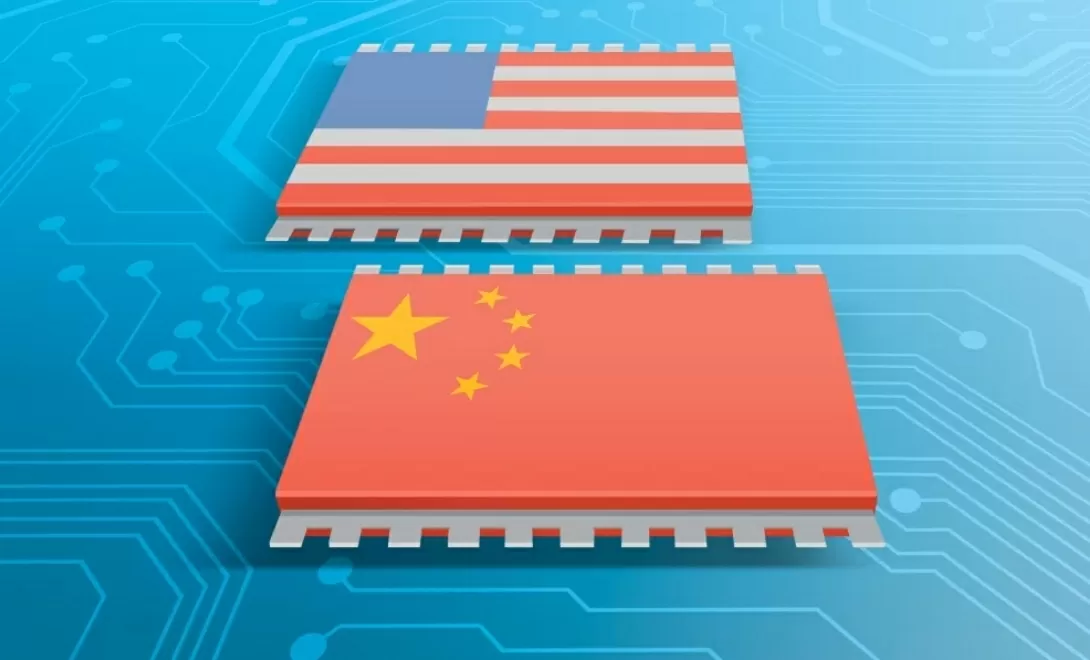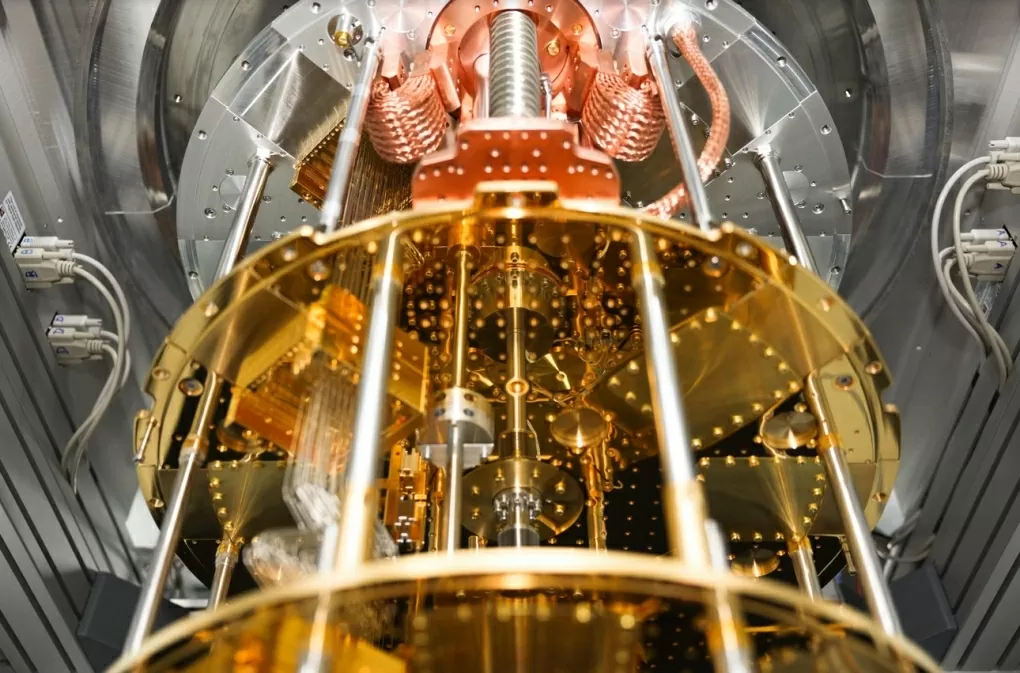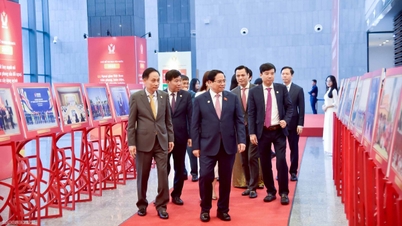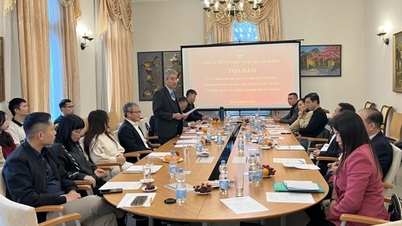 |
| Quantum technology is becoming a new front of competition between the US and China. (Source: CNN Money) |
Although the world's number one superpower, the United States, is still holding the leading position, China is still closely following to narrow the gap on the new "front".
Technology possesses unparalleled computing power
Quantum technology is ushering in a new era, exploiting the subtle mechanisms of quantum physics – the study of how matter behaves at the atomic and subatomic levels. The full application of these principles allows for the creation of entirely new types of computers, sensors and systems that are significantly more powerful than existing systems.
The fundamental difference lies in the way the problem is solved. As mathematician Hannah Fry explains, think of the process of solving a maze. A traditional computer tries each path one by one, whereas a quantum computer explores and evaluates all possible solutions at once.
This impressive computing power is the key factor driving breakthrough advances in science , finance, and global cybersecurity.
Quantum technology therefore has the potential to fundamentally change the way many important fields operate, including medicine, finance and artificial intelligence (AI), thanks to its superior computing power and sensing capabilities.
Global management consulting firm McKinsey estimates that quantum technology could generate up to $97 billion in revenue by 2035.
Despite its groundbreaking potential, quantum technology is still largely confined to laboratories or the realm of theoretical research.
So scientists and engineers are grappling with fundamental challenges in finding ways to make quantum systems reliable and scalable beyond the limits of early experiments.
However, analysts predict that the moment when quantum technology makes a breakthrough, is replicated globally and widely applied is very near.
Great opportunities always go hand in hand with risks and challenges are also predicted to be extremely large. Scientists believe that advances in quantum technology, especially with the advent of quantum computers capable of disabling banking codes, government agencies or many other important systems on the current Internet environment, seriously threaten the network security environment, opening up an extremely fierce technological competition front globally.
Will Beijing surpass Washington by 2027?
Technology experts say this is entirely possible, especially considering recent data showing a spike in patent filings in China, initially revealing Beijing's ambitions in the race to become a leader in quantum technology.
Despite holding the leading position in the list of patent registrations on quantum technology, it is clear that signals from Beijing show that Washington's position is under threat.
A recent analysis from LexisNexis predicts that, based on the speed and quality of patents, China could surpass the US as early as 2027.
Notably, this data is not only based on statistics but also signals that the strategic technology competition between the two world superpowers is entering a decisive phase of tension, and quantum technology will be a new and key "front".
Marco Richter, Director of Intellectual Property (IP) Strategy and Analytics at LexisNexis, asserts that patent data analysis – which is a reliable measure – plays a key role in predicting future technology trends early.
 |
| A quantum computer prototype developed by Baidu, China's Internet pioneer. (Source: Baidu) |
“The technological shift that we saw in EV patents years ago is starting to take shape in the quantum field. China will play a very important role in this technology in just a few years,” said Marco Richter.
Analyzing quantum technology patent data goes beyond mere statistics and assesses important factors such as global scope, relevance, and frequency of citation in new scientific research.
Since then, technology experts have realized that the old story of the confrontation between American "tech giants" such as IBM, Google (Alphabet) and Microsoft has become outdated. Clearly, Beijing is now showing that it is not only catching up but also creating new champions in this field.
The main reason for this strong rise lies in the financial commitment of this Northeast Asian country. China has poured a huge investment of 15.3 billion USD from the public budget into the field of quantum technology research.
This figure is more than eight times the $1.9 billion that the US has committed to investing, clearly demonstrating the determination of the world's second-largest economy to lead the global quantum race.
America's leading position in the field of quantum technology is quite "fragile" and is facing the risk of being overtaken at any time.
Earlier this year, Microsoft President Brad Smith publicly warned: “We cannot rule out the possibility of strategic surprises or that China may very well be on par with the United States in this area.”
In a post on his personal social networking site, Mr. Smith called on the US government and allied countries to urgently step up the implementation of a clear, coordinated strategy to protect technological advantages in competition that is expected to become increasingly fierce in the coming time.
Lessons from the semiconductor industry
Experts say the US currently has a clear advantage in private investment in quantum technology. However, it is unclear whether this private capital is sufficient to sustain the deep and long-term foundational research that is essential in the early stages of this technology's development.
Without a concerted and decisive push from the federal government, relying solely on private sector forces and short-term market incentives could see the United States lose its leadership position in this crucial technology area in the future.
Analysts often point to the semiconductor industry as a cautionary tale. The United States dominated the industry until it lost it. The world’s largest economy has spent billions trying to regain its advantage, but has yet to establish a safe distance from China and other rivals in this strategic industry.
 |
| An employee works at the Rigetti Fab-1 integrated quantum device manufacturing facility in Fremont, California, US. (Source: Getty Images) |
The US still holds several important advantages as the quantum era moves closer to reality. This week, Google announced that it had successfully run a breakthrough algorithm on its Willow quantum chip, paving the way for a range of potential applications in medicine and science.
Industrial applications are also flourishing. Last month, HSBC used IBM’s quantum processor to achieve the first global breakthrough in applying the technology to real-world algorithmic bond trading.
Meanwhile, Microsoft's development of a new, more stable quantum chip earlier this year caused great excitement in the tech-loving community.
Not to be left behind, Chinese companies like Origin Quantum are also constantly strengthening their competitiveness on a global scale, actively securing important research partnerships in Europe and many other regions.
Source: https://baoquocte.vn/sau-tri-tue-nhan-tao-day-se-la-mat-tran-tiep-theo-cua-cuoc-canh-tranh-my-trung-quoc-332829.html





![[Photo] Prime Minister Pham Minh Chinh chairs a meeting on housing policy and the real estate market.](https://vphoto.vietnam.vn/thumb/1200x675/vietnam/resource/IMAGE/2025/11/11/1762838719858_dsc-2107-jpg.webp)

![[Photo] Chu Noodles - the essence of rice and sunshine](https://vphoto.vietnam.vn/thumb/1200x675/vietnam/resource/IMAGE/2025/11/11/1762846220477_ndo_tl_7-jpg.webp)






























































































![Dong Nai OCOP transformation: [Article 4] Reaching national standard products](https://vphoto.vietnam.vn/thumb/402x226/vietnam/resource/IMAGE/2025/11/11/1762825820379_4702-cac-san-pham-trai-cay-chung-nhan-ocop-nongnghiep-174649.jpeg)



![Dong Nai OCOP transition: [Article 3] Linking tourism with OCOP product consumption](https://vphoto.vietnam.vn/thumb/402x226/vietnam/resource/IMAGE/2025/11/10/1762739199309_1324-2740-7_n-162543_981.jpeg)






Comment (0)